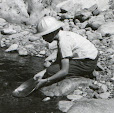SB 2750, aka the Abandoned Mine Reclamation Act of 2008, would bring a number of changes to the general mining laws that should be of concern to small-scale and recreational miners.
Like its predecessor in the House, HB 2262, SB 2750 would apply to "any mining claim...located under the general mining laws, before, on, or after the date of enactment of this Act". This means that placer claims, as well as lode claims, would fall under its control. Also, this act would apply to existing claims as well as to new ones.
Also like HB 2262, "production of all locatable minerals from any mining claim located under the general mining laws and maintained in compliance with this Act...shall be subject to a royalty of 8 percent of the gross income from mining." In any event, "(t)he royalty...shall be 4 percent in the case of any Federal land that is subject to an operations permit on the date of the enactment of this Act; and produces valuable locatable minerals in commercial quantities on the date of enactment of this Act."
One unfortunate aspect of this proposed legislation is that it makes the claim owner responsible for any "theft (of) the locatable minerals, concentrates or products derived therefrom which are produced or stored on a mining claim," although the act does not specify what penalty, if any, would be exacted from the victim of such a crime.
Also, as with HB 2262, SB 2750 requires "any person engaged in transporting a locatable mineral, concentrate, or product derived therefrom to carry on his or her person, in his or her vehicle, or in his or her immediate control, documentation showing, at a minimum, the amount, origin, and intended destination of the locatable mineral, concentrate, or product derived therefrom in such circumstances as the Secretary determines is appropriate." No mention here, at least, of forest rangers or police officers stopping motorists on the public highway to search their vehicles for "undocumented" minerals as was the case with HB 2262.
SB 2750 would also impose significant record keeping requirements on the claim holder who "shall establish and maintain any records, make any reports, and provide any information that the Secretary may reasonably require for the purposes of implementing this section or determining compliance with rules or orders under this section." The claim owner must also cooperate with any demand for an audit of his records and that "(f)ailure by a claim holder, operator, or other person...to cooperate with such an audit, provide data required by the Secretary, or grant access to information may, at the discretion of the Secretary, result in involuntary forfeiture of the claim."
As a claim owner, your mining-related records are also subject to audit "at reasonable times and upon request," and the Secretary shall "have access to, and may copy, all books, papers and other documents that relate to compliance with any provision of this section by any person."
Furthermore, if you accidentally dump your sluice box or tip your dredge into the river, you shall be "liable for royalty on all locatable minerals, concentrates, or products...lost or wasted from a mining claim located under the general mining laws and maintained in compliance with this Act...." There is no mention of how one would go about determining the value of any minerals so "lost or wasted."
In addition to the above provisions, the act would increase the annual maintenance fee to $300 per claim. If you have 10 or fewer claims and do the required assessment work, you can still qualify for the familiar "small miner exemption" and avoid paying the $300 fee. The act also imposes a $50 per claim location fee and a $100 per claim transfer fee. All of these fees are slated for increases to keep up with inflation, as and when the Secretary sees fit.
The above pretty much sums up this bill as far as it would apply to the small-scale and recreational miner. My main problems with this proposed legislation are:
1. It treats placer mining the same as lode (or "hardrock") mining when the two are entirely different in terms of the deposits they exploit, the methods used to extract the minerals, and the impact they have on the environment. Although billed as an "abandoned mine reclamation act", it appears blind to the fact that the abandoned mines in need of reclamation are lode mines, not placer mines.
2. It contains no exemption for small-scale and recreational miners and, as such, threatens to render these activities impractical even though they do not and never have contributed to the problems associated with abandoned lode mines.
As small-scale and recreational miners already know, their placer mining activities are already highly regulated at the state level and hardly need new legislative burdens applied; especially when those burdens appear tailored to large-scale commercial "hardrock" operations. Perhaps the congressional sponsors and supporters of the legislation are simply unaware of the thousands of amateur and recreational prospectors and miners and of the local economies that have grown up around providing for their needs?
Perhaps we can enlighten our Congresspersons to our existence and activities so that they do not allow us to get squashed in the gears of their general mining reform legislation? I certainly hope so.
To read the entire text of the proposed bill, visit the link here.
Subscribe to:
Post Comments (Atom)

No comments:
Post a Comment